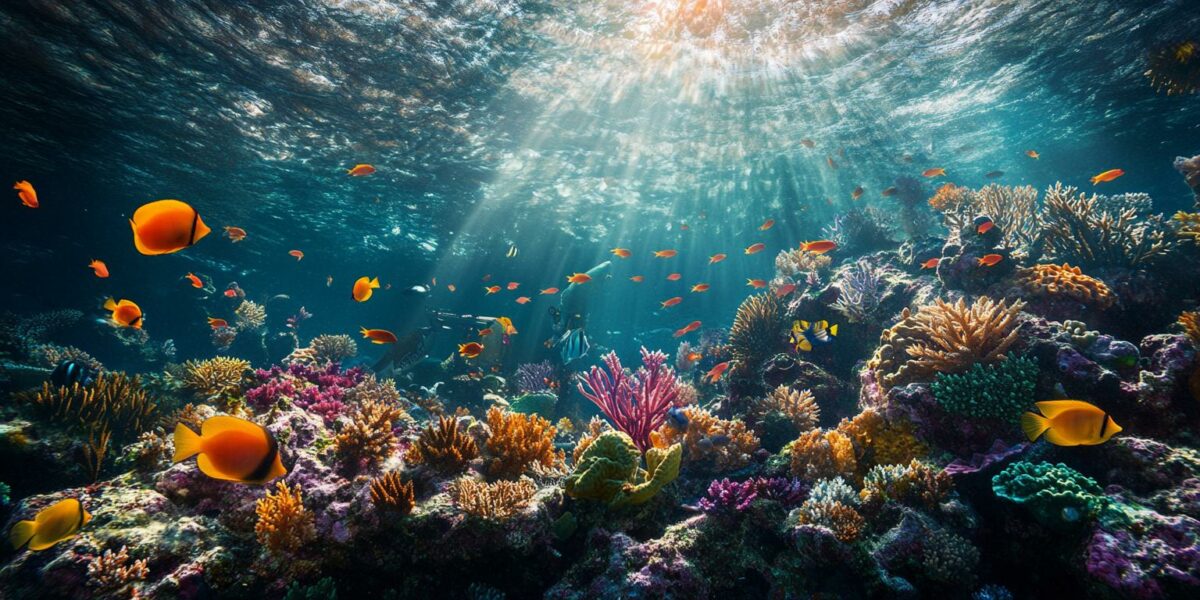The Silent Struggle of Coral Reefs
Coral reefs are facing a dire threat due to climate change. Record-high ocean temperatures are causing these underwater ecosystems to degrade, leading to a significant decline in their vibrant sounds. Healthy coral reefs are known for their unique soundscape, but this is rapidly changing for the worse.
Researchers from Massachusetts have found that the sounds of a healthy reef are crucial for the survival of coral larvae. Without these sounds, young corals are less likely to settle and thrive. This discovery highlights the importance of maintaining the acoustic environment of coral reefs.
Over the past three decades, approximately 25% of all coral reefs have been lost. This is alarming, considering that coral reefs support marine life, protect coastlines, and provide food and tourism opportunities for millions of people globally.
The degradation of coral reefs is not just an environmental issue but a socio-economic one as well. The loss of these ecosystems can have far-reaching impacts on communities that rely on them for their livelihood.
Innovative Solutions: Bringing Sound Back to Reefs
In an effort to combat this degradation, scientists have developed the Reef Acoustic Playback System (RAPS). This system involves playing recordings of healthy reef sounds on degraded reefs to attract coral larvae and promote settlement.
Aaron Mooney and his team conducted studies in the US Virgin Islands to observe the effects of RAPS. They found that baby corals were seven times more likely to settle in areas where healthy reef sounds were played.
This technique shows promise for reef restoration, as it helps to mimic the natural environment that corals need to thrive. By restoring both the structure and the soundscape of reefs, scientists hope to encourage coral growth and recovery.
The success of RAPS in the US Virgin Islands has opened up possibilities for its application in other areas. Researchers are optimistic that this method can be adapted to help restore reefs worldwide.
Sound as a Tool for Marine Conservation
Sound is not only beneficial for coral reefs but also for other marine life. Studies in Australia have shown that using sound can increase oyster settlement, which could aid in rebuilding oyster reefs. This technique has the potential to revolutionize marine conservation efforts.
Using sound to attract marine life involves several benefits:
- Non-invasive approach
- Cost-effective compared to other methods
- Can be easily implemented in various marine environments
The potential for sound to aid in habitat restoration extends beyond just coral and oyster reefs. It underscores the importance of acoustic environments in marine ecosystems and how they can be leveraged for conservation.
Marine biologists are now exploring how these acoustic techniques can be integrated into broader conservation strategies. The goal is to create a multi-faceted approach to tackle the complex challenges posed by climate change.
Future Prospects and Research
Ongoing research aims to refine the use of sound in marine conservation. Scientists are studying how different species respond to various soundscapes to optimize restoration efforts. This research is crucial for developing targeted strategies that maximize the benefits of sound-based interventions.
Collaboration between marine biologists, conservationists, and local communities is essential. By working together, they can develop and implement effective solutions to restore and protect marine ecosystems.
As climate change continues to impact our oceans, innovative approaches like RAPS offer hope. These methods not only address the immediate needs of coral reefs but also contribute to the long-term sustainability of marine life.
The journey to restore coral reefs is challenging, but with persistent effort and creative solutions, there is potential for a brighter future for these vital ecosystems. The use of sound is just one example of how science and technology can offer new ways to combat environmental challenges.



andrew
Reef Acoustic Playback System? Sounds like a DJ for the ocean! 😂 But seriously, great work!
wesley
Can these techniques also help in restoring other marine habitats like mangroves or seagrass beds?
Charles_Wanderlust
I love this idea of using sound for conservation! Keep up the good work, scientists! 😊
whiskersmoonlight
This sounds like science fiction! How do they ensure the sound quality mimics actual reef sounds?
Gizmo
Does anyone know how long it takes for these sound techniques to show visible results on the reefs?
victoria8
Thank you for sharing this! It’s great to see innovative solutions for coral reef restoration.
benjamin9
Interesting concept, but isn’t playing sounds underwater going to disturb other marine life?
aaronwhisper
Wow, this is amazing! How soon can we see RAPS being used globally? 🌍